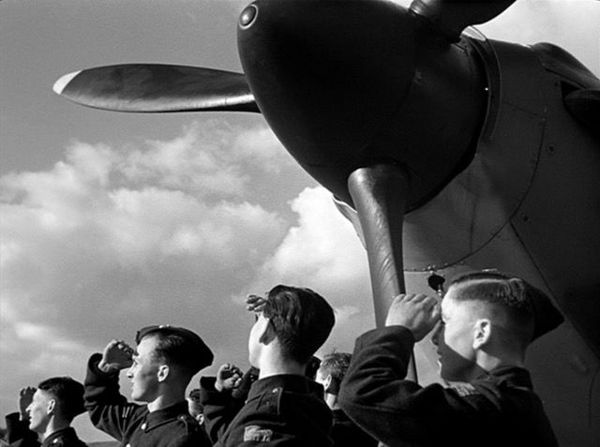Eye For Film >> Movies >> Words For Battle (1941) Film Review
Words For Battle
Reviewed by: Rebecca Naughten

Using readings of classic literary works about Britain to make connections between the country's more ancient qualities and contemporaneous events, director Humphrey Jennings creates a cine-poem through his montage of words and images. Intoned by Laurence Olivier, the readings may sound somewhat portentous to modern ears but when juxtaposed with images of wartime Britain, the words nonetheless accrue nostalgia and form a comfortingly romantic vision of the country. But they also simultaneously suggest that its citizens will endure and survive current traumas just as the land has endured over centuries.
The eight minutes of running time effectively create an anthology of classic prose and poetry - William Camden's Britannia, Milton's Aereopagitica, Blake's Jerusalem, Browning's Home-Thoughts From The Sea, and Kipling's The Beginnings among them - wherein the words lend themselves to reflections on Britain's then-current situation. While most of them are gently uplifting when used in conjunction with images of this "green and pleasant land", Kipling's verse (written in relation to the previous war but here spoken over images of the aftermath of a bombing in a residential area) points to darker undercurrents within a country at war, with the rhythm building an unsettling momentum - 'It was not part of their blood,/ It came to them very late/ With long arrears to make good,/ When the English began to hate'.

That sequence segues into Winston Churchill's We Shall Fight Them On The Beaches speech - if the first half of the film is a predominantly romantic vision of Britain, the second half settles into something more steely (as suggested by the title). Despite that - and some great 'new' footage (the film mixes sequences that were specifically filmed for this short with archival images that are not as crisp - or as well framed) - the film lacks the lively spark and sense of nationwide collectivism of Jennings' subsequent film, Listen To Britain. The difference probably comes down to the style and content of the narration - the later film is entirely made up of the sounds of everyday life, against which the combination of Olivier and literary classics seems a bit stodgy.
Reviewed on: 21 Feb 2016














